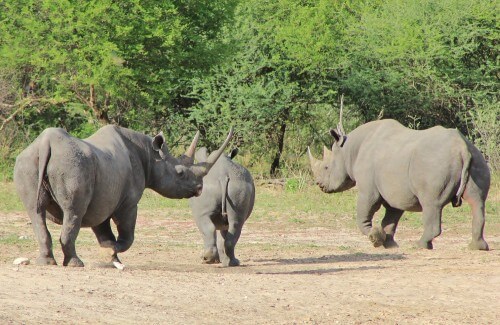The conference at "Lancaster House" in London was attended by representatives of 46 countries and 11 organizations, including four African presidents and representatives from China and Vietnam. At the end of the conference, they all signed a statement calling for an end to the wild trade in wild animals, which will henceforth be known as the "London Declaration".

FollowingThe UN resolution to stop the trade in elephant and rhino parts which we reported last week,
Leaders of countries and environmental bodies came out announcing accelerated activity to prevent the trade in wild animals.
The conference at "Lancaster House" in London was attended by representatives of 46 countries and 11 organizations, including four African presidents and representatives from China and Vietnam. At the end of the conference, they all signed a statement calling for an end to the wild trade in wild animals, which will henceforth be known as the "London Declaration".
In the statement, a "road map" is indicated that will describe the activity to stop the wild poacher. A "roadmap" according to which poaching will be considered a criminal offense (as in the UN resolution). The representatives of the countries pledged to improve and strengthen cross-border cooperation and strengthen anti-trafficking laws and policies. The statement calls on the governments to eliminate poaching crimes, investigate and aggressively punish the criminals and the corrupt and biased officials at the government levels. Also, all levels must be taken care of, starting with the hunter through the orderers and suppliers of the "goods".
According to various sources, the value of the wild trade in wild animals exceeded the enormous amount of 20 billion dollars, which puts the cruel trade in an "honorable" place along with the trade in weapons, drugs and human trafficking in general and women in particular. According to representatives of environmental organizations who welcome the declaration: "The declaration must be translated into immediate action to prevent the disappearance of 'key species' whose survival depends on containment, when tens of thousands of elephants, rhinos and tigers are hunted every year, the future of the species is in danger." According to those representatives, there should be a complete ban on the ivory trade and at the same time destroy all the stocks of tusks that are stored in different countries, "without a ban and destruction, the wild poaching will not stop".
Although most of the poaching activity takes place in Africa, there is elephant and tiger hunting in Asia, when the demand for "goods" is mainly in Asia, where animal products such as rhinoceros horns, tiger and tiger bones are used in traditional medicine, and ivory is also purchased as a status symbol.
Actions that were decided as part of the London Declaration are:
- Treating animal trafficking as a criminal offense (within the framework of the UN Convention against Organized Crime)
- A (constitutional) reference to corruption and money laundering (related to wildlife trade) with zero tolerance
- Strengthening the law and enforcement frameworks
- Improving the connections between agencies that deal with the prevention of wildlife trafficking
- Support for governments and entities that destroy products from wild animals - ivory, skins, horns, etc.
- Denouncing governments that use products from endangered animals
According to the Convention on Trade in Endangered Species (CITES), the trade in ivory has been prohibited since 1989. In 1999, several countries were allowed to sell their ivory stocks. Zimbabwe, Botswana and Namibia sold ivory to Japan. In 2008, ivory stocks from Namibia, Botswana, South Africa and Zimbabwe were sold to China.
As a tribute to the declaration and as an activity to protect the herds of elephants, representatives of Botswana, Chad, Gabon and Tanzania announced a moratorium on the ivory trade for at least ten years. Later the president of Tanzania announced that he would see to the destruction of dozens of tons of elephant tusks in warehouses.
It remains to be hoped that the "London Declaration" will come into effect and the destruction of the animals will stop. It turns out that even leaders are beginning to understand that the time has come that instead of controlling the environment for the sake of the human population, there will be control of the human population for the sake of the environment!
